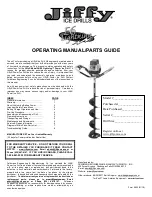
G
Safety Warnings
The following safety warnings and precautions
must be
read and understood before the
instrument is used. They must be observed during use.
n
For safety, only connect the PAT to a supply that is properly earthed. If in doubt, the
supply should be checked by a qualified electrician.
n
Do not use
the instrument if there are any signs of damage.
n
All test leads, probes and clips
must be
in good order, clean and with no broken or
cracked insulation.
n
Probes and clips should be held behind the finger guard.
n
Test leads not used during a measurement should be disconnected from the appliance
tester.
n
For dual voltage testers, both sockets can be live simultaneously.
n
Only connect one asset to the PAT during testing.
n
Tests should be carried out in the order recommended below. An appliance that fails a
test should be repaired before further testing is carried out.
Recommended sequence:
1. Visual inspection.
2. Earth bond/ continuity of the protective earth conductor (Class I devices).
3. Insulation test (or earth leakage).
In addition further tests can be performed, but ONLY AFTER 1 & 2 above.
4. Operation test.
5. Leakage test.
n
Only perform an operational test after the earth bond and insulation tests have been
completed, as this test operates at mains voltage.
n
During testing, ensure no hazard will exist as a result of normal running or under fault
conditions.
n
During testing the unit under test (asset)
should not
be touched, other than using the
appropriate accessories, as faulty appliances can present a shock hazard.
n
Do not
touch the exposed parts of test leads during tests as hazardous voltages may be
present due to potentially faulty appliance.
n
Do not
touch the IEC extension lead socket pins especially during a test, as hazardous
voltages may be present due to a potentially faulty appliance.
n
Assets
should not
be routinely flash tested. Where flash testing is required, refer to
further guidance on flash testing in the user guide.
n
Replacement fuses must be of the correct rating and type. Refer to the user guide.
n
The USB connection marked thus
should only be used by approved service
personnel; nothing should be connected to the USB port during testing.
n
Only use a NiMH rechargeable 8.4 V PP3 battery,
do not
use a non rechargeable type as
this could become dangerous if charged by the instrument.
n
Serviceable fuses
should
only be replaced with those that are suitably rated.
n
In case of an emergency use an easily accessible power point.
n
Only use Megger approved accessories with this product.
For service requirements contact:
Megger
or
Megger
Archcliffe Road
Valley Forge Corporate Centre
Dover
2621 Van Buren Avenue
Kent CT17 9EN
Norristown PA 19403
England.
U.S.A.
Tel: +44 (0) 1304 502 243
Tel: +1 610 676 8579
Fax: +44 (0) 1304 207 342
Fax: +1 610 676 8625
Symbols used on the instrument
F
Caution
: risk of electric shock.
G
Caution
: refer to accompanying notes.
c
Equipment complies with relevant EU Directives.
Equipment complies with ‘C tick’ requirements.
Fused.
This equipment should be recycled as electronic waste.
HV test lead in unlocked position.
HV test lead in locked position.
Battery type fitted.
DO NOT
connect to 230 V supply.
Printed in the UK Part No. PAT400_QS_2000-965_en_V03
N13117




















